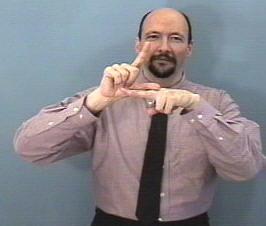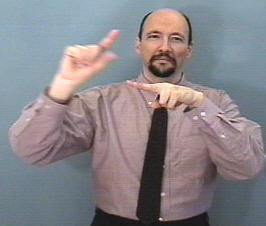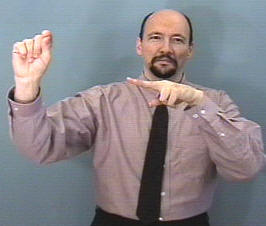American Sign Language: "train-gone"
/ "Train gone, sorry!"
What does "train gone sorry" mean? You might see this phrase if you show up in the middle of a conversation or near the end of a conversation and ask what is being talked about. Someone in the group may use this phrase to tell you that "you missed it" and they aren't going to re-tell the story just so you can know what they are talking about (or perhaps they were talking about you and don't want you to know what they were saying). Often you will see the "TRAIN-GONE" sign followed by the sign "SORRY."
The sign for "train-gone" is based on the sign for TRAIN-(vehicle). The sign starts by placing the dominant hand in an "L"-handshape onto a palm-down non-dominant "U"-handshape. The non-dominant hand represents the train tracks. The dominant "L"-hand represents the train "in the station." Then you move the "L"-hand forward, out, and away from the "train station" and change the handshape from an "L" into a closed-"G"-hand. The change in handshape represents the train getting smaller and smaller as it "goes further away" until it is gone.
TRAIN - GONE:
Notes:
There are several ways to do this sign.
Some people do the full sign for TRAIN and then add the TRAIN-GONE sign.
This sign is an "ASL idiom."
Question: A student asks:
Can I sign "train go sorry" with the sign GO or LEAVE instead of the sign for ZOOM?
Response:
In American Sign Language, the signed phrase "Train gone, sorry!" using the signs "ZOOM-(DH: L > closed-G / NDH: loose-H or H) depiction: fade into the distance along railroad tracks) SORRY" is a well-established metaphorical idiom used to inform or tease latecomers to a conversation that the current conversation is not going to be paused in order to explain previously signed information. In other words, it is a lighthearted way of stating "I'm not going to repeat myself."
Note: In typical situations the information is sometimes repeated or repeated at a more convenient time because Deaf people value keeping each other informed.
Note: DH is sometimes used in written or typed notes as an abbreviation for dominant hand. NDH is sometimes used as an abbreviation for non-dominant hand.
The signed phrase TRAIN GONE SORRY exemplifies both the characteristics of an idiom and a metaphor:
As an idiom, "Train gone, sorry!" has a figurative meaning that cannot be deduced from the literal definitions of its individual signs.
Simultaneously, it functions as a metaphor by creating a figurative comparison between missing a physical train and missing introductory details of a conversational topic.
In real-life everyday signing (as compared with instructional ASL or dictionary explanations of signing) it is common to see various small differences in how the phrase "train gone, sorry" is signed. Some people start with the sign TRAIN. Others omit the sign train and just sign ZOOM SORRY. Some sign TRAIN and then do a version of ZOOM-(L > closed-G) (which is actually a form of depictive lexicalization) that doesn't use the non-dominant hand.
Advanced signers may sometimes choose to deliberately sign the phrase "train gone, sorry" using exaggerated versions of the signs that are typically used in the phrase.
ASL as a second language learners however should generally stick with the signed version that uses the "L" to "closed-G" version of the sign for "go" or "gone" and do it on the base hand using an "H" to represent the tracks.
See: TRAIN-GONE [slang, idiom, pun] (version that uses TRAIN and ZOOM-(DH: L to closed-G / NDH: H) https://youtu.be/zMKtI27VVIo
See: TRAIN-GONE SORRY-[index finger version] https://youtu.be/dJrlDBcxsQU
See: TRAIN GONE SORRY https://youtu.be/ytZCgTGwpic
You can learn American Sign Language (ASL) online at American Sign Language University ™
ASL resources by Lifeprint.com © Dr. William Vicars
Want to help support
ASL University? It's easy:
DONATE (Thanks!)
(You don't need a PayPal account. Just look for the credit card
logos and click continue.)
For a list of various ways to donate see:
https://www.Lifeprint.com/donate
Another way to help is to buy something from the ASLU "Bookstore."
Want even more ASL resources? Visit the "ASL Training Center!" (low
cost / high quality courses)
CHECK IT OUT >
A must see!:
ASL University's YouTube playlist ►


